Newsletter 2022/2
September 2022
Introduction
Welcome to the Tribunal’s summer newsletter, which I am writing at a time when there is much excitement and anticipation surrounding the work of both the Tribunal and the global ocean community at large.
In June, I had the opportunity to present the Tribunal’s Annual Report for 2021 to the thirty-second Meeting of States Parties to the United Nations Convention on the Law of the Sea, during which the budget of the Tribunal for 2023–2024 was also approved. As in previous years, I reported to the Meeting on the Tribunal’s judicial work, including on the developments in the Dispute concerning delimitation of the maritime boundary between Mauritius and Maldives in the Indian Ocean (Mauritius/Maldives) and in the M/T “San Padre Pio” (No. 2) Case (Switzerland/Nigeria). While the latter case was discontinued pursuant to an order dated 29 December 2021, the written phase of the proceedings in the former case is on schedule with oral hearings to take place later this year. I also informed delegations about the various activities undertaken by the Tribunal to further capacity-building.
Since the last newsletter was published, I have had the opportunity to give keynote statements and discuss emerging issues at a number of conferences and meetings. The emphasis of each event has been different, be it fisheries, the peaceful settlement of disputes as reflected in Part XV of the Convention, the advisory jurisdiction of the Tribunal, or the prospects and challenges of the Convention in the context of the fortieth anniversary of its adoption.
Turning to other ocean-related news, July saw the successful culmination of the United Nations Ocean Conference in Lisbon, where numerous statements on ocean policy were given by heads of State and other officials on various topics of relevance to both the work of the Tribunal and the implementation of the Convention. The conference expressed overwhelming support for the continued relevance of the Convention, including in the outcome document of the conference, the Lisbon Declaration on “Our ocean, our future, our responsibility”, in which delegations affirmed “the need to enhance the conservation and sustainable use of oceans and their resources by implementing international law as reflected in the UN Convention on the Law of the Sea, which provides the legal framework for the conservation and sustainable use of oceans and their resources.” Furthermore, we note that the fifth session of the Intergovernmental Conference on an international legally binding instrument under the Convention on the conservation and sustainable use of marine biological diversity of areas beyond national jurisdiction took place, and that progress was made towards the conclusion of a comprehensive instrument. The conference presents a unique opportunity to reflect on the emergence of new ocean challenges and what this might mean for ocean governance and the law of the sea. In that context, it is important to underline that the Tribunal remains available and ready to discharge its function of peacefully settling disputes concerning the interpretation or application of the Convention and, in so doing, to clarify and develop the law of the sea and international law in general.
This year is a busy year insofar as the capacity-building activities of the Tribunal are concerned. The fifteenth ITLOS regional workshop took place in June in Malta, where I, Vice-President Heidar, Judges Attard, Paik and Caracciolo, and Registrar Hinrichs Oyarce gave presentations on jurisdiction, urgent proceedings, advisory proceedings and the procedure for bringing cases before the Tribunal as well as on the jurisprudence of the Tribunal regarding maritime delimitation disputes. In July, the ITLOS-Nippon capacity-building and training programme 2022/2023 started for six new fellows and we look forward to accompanying them during their course of lectures, workshops, training sessions and study visits and supporting their research on topics related to the law of the sea . Last month also saw the resumption of the Summer Academy in an in-person and on-site format. This was the fourteenth edition of the Summer Academy, organized by the International Foundation for the Law of the Sea at the premises of the Tribunal, with Judges, distinguished legal scholars and various practitioners teaching in the Academy. The inaugural ITLOS Workshop for Legal Advisers (sponsored by the Republic of Korea) will be held in the coming days and we look forward to welcoming participants from South-East Asia and Pacific Small Island Developing States to the Tribunal for what is sure to be the start of another successful series of workshops.
I hope that you enjoy reading the newsletter.
With my warmest regards,
Albert Hoffmann
President
ITLOS Cases
In accordance with the Order of the President of the Special Chamber of 15 December 2021, the Rejoinder of the Maldives was filed on 15 August 2022. By Order dated 18 August 2022, the President of the Special Chamber fixed Monday, 17 October 2022, as the date for the opening of the public hearing in the case. The detailed schedule of the hearing will be announced in due course.
Interview with Judge José Luis Jesus (Cabo Verde)
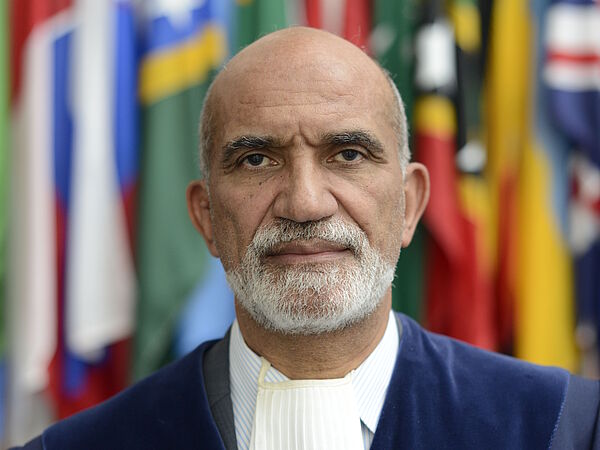
Originally elected in 1999 and most recently re-elected in 2017, you are the Tribunal’s most senior Judge. In your opinion, how has the Tribunal changed since you were first elected and what are some of the hopes you have for the Tribunal going forward?
The Tribunal has changed in many ways, though without affecting the core of its purpose, which is to adjudicate disputes arising out of the interpretation and application of the 1982 UN Convention on the Law of the Sea (the Convention). Several judges who served in the initial years of the Tribunal’s existence are no longer in function. Among the members of the Tribunal we had in those early years, there were many who had participated in the Law of the Sea Conference. Their first-hand knowledge of the negotiations that led to the adoption of the Convention contributed immensely to the collective wisdom of the Tribunal, as reflected in its jurisprudence. As time goes by, the membership renewal process brings fresh air to our activities, a welcome change that always offers added value to the collective work of the Tribunal.
The Tribunal’s jurisprudence has broadened and strengthened with the passage of time, becoming ever more solid as the Tribunal entertains disputes and gives advisory opinions relating to various provisions of the Convention covering a range of matters and disputes, such as delimitation of maritime boundaries, fisheries, seabed mining-related issues and prompt release of vessels and crew, just to name a few.
It is difficult to predict what the future holds for the Tribunal. However, as the seas and oceans are becoming an area of increasing economic interest for States, I can only say that the Tribunal is well placed to discharge its judicial function, conferred on it by the Convention, assisting States in the resolution of their law of the sea-related disputes. It is a judicial body specialized in the law of the sea and, as such, it has accumulated substantial expertise and experience in handling disputes relating to a wide range of law of the sea matters under the Convention.
Considering the jurisprudence of the Tribunal, what, in your opinion, are some of the most valuable contributions that the Tribunal’s work has made to the law of the sea and to international law generally?
I believe that, all in all, our jurisprudence reflects a mature interpretation of the Convention and through it, the Tribunal has contributed much to the clarification of some important provisions of the Convention relating to, for example, rights of States in the exclusive economic zones, the sovereign immunity of warships, the issue of nationality of ships and its relationship with the issue of genuine link – clarification that may put to rest a never-ending debate among scholars on these issues. The Tribunal has also made an important contribution in the field of maritime border delimitation, having been the first Tribunal to proceed with the delimitation of the continental shelf beyond 200 nautical miles. It has also clarified the obligations of sponsoring States under the Convention for mining in the Area.
UNCLOS aims to settle, in a spirit of mutual understanding and cooperation, all issues relating to the law of the sea and acknowledges that the problems of ocean space are closely interrelated and need to be considered as a whole. What advice would you have for young students to motivate them to study, understand and apply the ethos enshrined in the Convention?
Law of the Sea, as a branch of international law, is as vast as the sea it regulates and therefore it takes decades of study, dedication and perseverance for a student to become a good professional in the field. I believe that for those students who are willing to make a living out of law of the sea and to become very familiar with it, it may be important to remind them that any international shared space, such as the sea, requires a process of give and take and, therefore, they should always bear in mind that cooperation in the seas means not only pushing for our rights but also recognizing the rights of others.
The Tribunal as well as the Seabed Disputes Chamber have effectively exercised their advisory roles in the past. What role do you think advisory opinions of the Tribunal could play in issues surrounding any international instrument adopted under UNCLOS on the conservation and sustainable use of marine biological diversity of areas beyond national jurisdiction or on issues of climate change and its interaction with the law of the sea?
As the Tribunal is a creation of the Convention which conferred on it jurisdiction to resolve any dispute arising out of the interpretation of the Convention, it makes sense that any dispute or request for an advisory opinion arising out of a provision of any convention or treaty adopted as a development of the Convention – such as the one referred to in the question – be submitted to the dispute settlement system under the Convention. Doing otherwise may lead to divergent decisions of different judicial bodies and unnecessary costs for States. Regarding the possible role of the Tribunal on climate change-related issues, it is obvious that, owing to the limitations of our jurisdiction, the Tribunal has no role to play unless those issues relate to the interpretation or application of the Convention.
Capacity Building
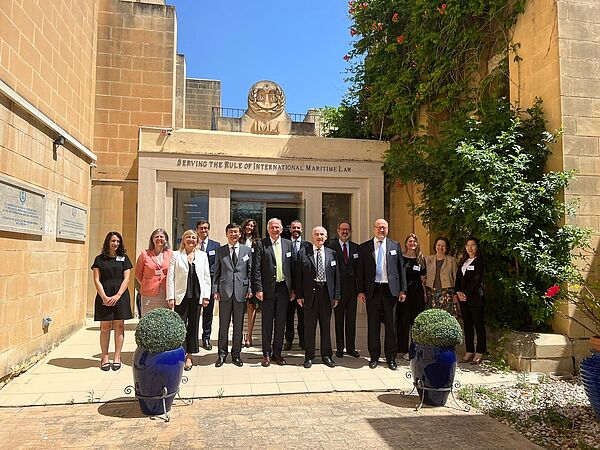
In June 2022, the Tribunal hosted the fifteenth regional workshop on “The Role of the International Tribunal for the Law of the Sea in the Settlement of Disputes relating to the Law of the Sea” in Malta. The workshop provided participants with an overview of proceedings before the Tribunal, with sessions dedicated to jurisdiction, urgent proceedings, advisory proceedings and the procedure for bringing cases before the Tribunal. Presentations were given by President Hoffmann, Vice-President Heidar, Judges Attard, Paik and Caracciolo, and Registrar Hinrichs Oyarce.
The inaugural ITLOS Workshop for Legal Advisers (sponsored by the Republic of Korea) will take place in September 2022. The week-long workshop, organized for legal advisers of States from South-East Asia and Pacific Small Island Developing States, will offer participants a series of lectures and discussion rounds with Judges, academics and practitioners on topics relating to the jurisdiction and jurisprudence of the Tribunal as well as to current and relevant issues in the law of the sea.
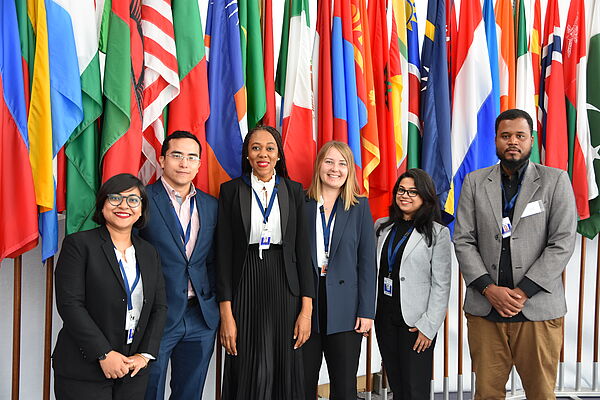
ITLOS-Nippon capacity-building and training programme on dispute settlement under UNCLOS
Following a successful application process, Oghenekome Adhekpukoli (Nigeria), Ricardo Vieira Tavares (Guinea-Bissau), Tamanna Khan (Bangladesh), Devdatta Mukherjee (India), Olesia Gorbun (Ukraine) and Osvaldo Rosas Pino (Panama) were selected to participate in the 2022/2023 ITLOS-Nippon Foundation fellowship.
The six fellows have already participated in introductory lectures dedicated to dispute settlement under the Convention, including aspects related to provisional measures, advisory opinions and the challenges to jurisdiction and procedural aspects. The fellows are currently participating in the fourteenth IFLOS Summer Academy. Throughout the nine-month programme, the fellows will follow a series of lectures, workshops and training sessions, and will participate in organized study visits.
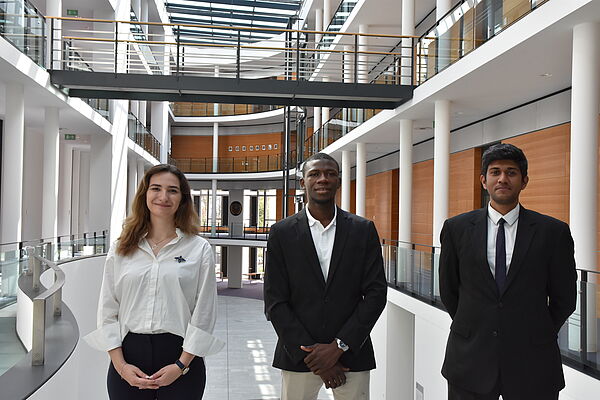
Internship programme
El Hadj Kokinde Dosso (Côte d’Ivoire), Suriya Sundararajan (India) and Angela Trajkovska (North Macedonia) completed their internships in the Legal Office at the end of June. Their research was dedicated to “Les instruments juridiques conférant compétence au Tribunal international du droit de la mer”, “Contiguous Zone: A legal analysis in the light of Nicaragua v. Colombia” and “ITLOS in the International Legal Order: its Interactions and its Contributions”, respectively.
At the start of July, the Tribunal welcomed Carola Gritella (Italy), Sara Guliyeva (Azerbaijan), Melissa Kor (Singapore) and Youlin Zhao (China) for internships in the Legal Office. During their time at the Tribunal, they will be involved in research projects relating to international law of the sea and will assist in the preparation of legal documents and in any other matters that may arise in the work of the Registry.
Alumni network
The alumni network series of events continued with alumni presentations by Lauren Beagen (USA) on “The global supply chain and the U.S. regulatory framework”; Xiangxin (Lily) Xu (China) on “The Environmental Compensation Fund: Bridging Liability Gaps in the Deep Seabed Mining Regime”; Juan-Pablo Pérez-León-Acevedo (Peru) on “International Maritime Terrorism at International Tribunals and Courts: Lex Lata and Lex Ferenda Considerations”; and Nicolás Córdoba (Colombia) on “A call for action – The Convention on Animal Protection”. A number of alumni conversations were also held with Angel Horna (Peru), talking about his experience as a diplomat, including as an Adviser to the Cabinet of Peru’s Foreign Minister; María Juliana Tenorio Quintero (Colombia), talking about her experience as a member of the Colombian delegation at the ongoing meetings of the UN conference charged with drafting an international legally binding instrument under UNCLOS on the conservation and sustainable use of marine biological diversity of areas beyond national jurisdiction; Strahinja Ivanovic (Serbia), on his work as a consultant at the World Trade Organization; Inês Aguiar Branco (Portugal), on her experience as a Technical Expert in the Ministry for Economy and Sea of Portugal and her involvement in the organization of the UN Ocean Conference; and Pablo Nilo Donoso (Chile), on his work focusing on international investment disputes at Foley Hoag LLP.
Meet the ITLOS Alumni
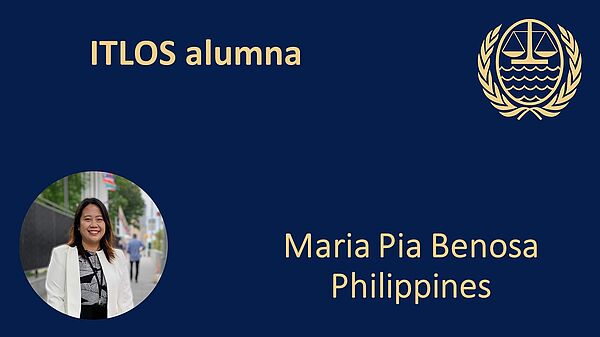
Maria Pia Benosa (Philippines), Research Associate (Ocean Law and Policy), National University of Singapore (NUS) Centre for International Law (CIL)
I had the privilege of doing my legal internship at the Tribunal in the winter of 2016 right after completing my Juris Doctor degree from the University of the Philippines. By that time, I was also working part-time as a junior researcher for a government research institution dealing with the law of the sea in the Philippines. I had a huge interest in the subject but was unsure about whether I could work on it long-term, as most law graduates in the country usually join law firms for corporate practice after passing the bar examinations. The few who are able to break into international law, on the other hand, only do so much later in their careers.
My three-month internship turned out to have a profound effect on my early career. Over the next three years I became a Legal Officer for the Institute for Maritime Affairs and Law of the Sea (IMLOS) of the University of the Philippines, held the Hamilton Shirley Amerasinghe Fellowship at the UN Division for Ocean Affairs and Law of the Sea in New York City, and finished an LL.M. in National Security Law from Georgetown University in Washington, D.C. under a Fulbright grant. Upon my return to the Philippines, I had the opportunity to provide training and legal advice to government agencies, security sector officials and civil society organizations on issues relating to maritime security, dispute settlement and special challenges in law of the sea implementation for archipelagic States. I also became part of several Philippine delegations to key regional and international dialogues and conferences, including the Intergovernmental Conference on Biodiversity Beyond National Jurisdiction (BBNJ).
Since 2021, I have been with the ocean law and policy team of the Centre for International Law (CIL) at the National University of Singapore, where I continue to work on issues relating to BBNJ, maritime security in South-East Asia and the international regulation of shipping. Most recently, with international travel rebounding from the pandemic, I had the chance to attend and interact with a variety of maritime actors and stakeholders at the 2022 UN Ocean Conference in Portugal*, and the 25th edition of the Rhodes Academy of Ocean Law and Policy in Greece.
I am very glad to say that through all of the activities I got to take part in since 2016, it has been hard to not bump into other alumni of the Tribunal. It’s always a pleasure to be forming new connections this way with fellow law of the sea enthusiasts who all look back fondly on such pivotal experiences that they’ve had in Hamburg as I do!
——————
*With the support of NUS Centre for International Law and as part of the delegation of the Advisory Committee on the Protection of the Sea.
Upcoming Events
The ITLOS Workshop for Legal Advisers (sponsored by the Republic of Korea) will be held from 11 to 16 September 2022.
The next administrative session of the Tribunal will be held from 19 to 30 September 2022.
The public hearing in the Dispute concerning delimitation of the maritime boundary between Mauritius and Maldives in the Indian Ocean (Mauritius/Maldives) will start on 17 October 2022.

